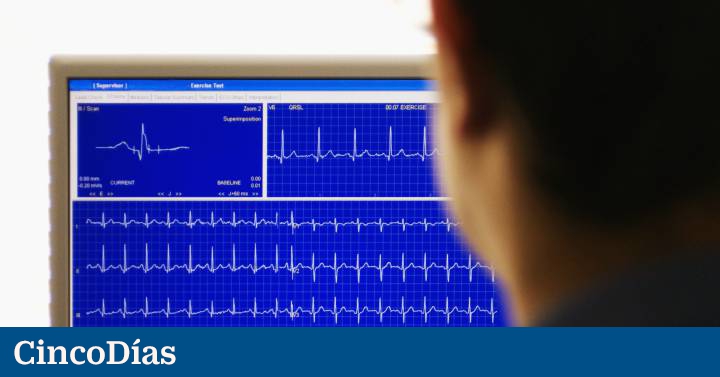
In the first wave, because non-urgent medical consultations and tests were suspended; later because of the amount of medical resources absorbed by the coronavirus and now also because many patients do not want to go to the doctor unless it is an emergency. Some patients ask to postpone their check-ups for a few months for fear of catching it.
“It has not yet been possible to resume pre-Covid healthcare,” says Carina Escobar, president of the Patient Organizations Platform, and many follow-ups are still remote (telephone or telematic), which “does not replace the tests needed to reach diagnoses and treatments.” .
One of the reasons for the current traffic jam is that many tests (endoscopes, biopsies) now require a negative PCR, clarifies Jesús García Foncillas, director of the oncology department at Fundación Jiménez Díaz Hospital. “And that means a slight delay in diagnosis, even though it has already been minimized,” he says.
Chronic patients were among the most affected because, according to Escobar, “the health system is created especially for acute patients.” For example, death from a heart attack doubled in the first stage of the pandemic and 28% fewer patients with symptoms of a heart attack were treated, according to the Spanish Society of Cardiology (SEC). Not to mention other pathologies such as cancer or rare diseases.
Biopsies were reduced by 41% and chemotherapy by 9.5% during closure
For Eva Fernández, the epidemic was a blow. Her baby, Diego Torronteras, 19 months old, was diagnosed with Allan Herndon Dudley syndrome, a condition that causes cerebral palsy for more than six months.
“In addition to the suspension of physiotherapy sessions (two per week), crucial for these children, who make all the progress in the first six years of life, many of them were on the phone and the child did not progress,” says Fernández, who called on the private one, which means about 700 euros per month.
The Jiménez Díaz Foundation resumed rehabilitation, but reduced it to one session per week “because there is no space and it is still waiting to be given an early care center, the key to its recovery.”
Other affected groups
Among chronic patients, diabetics, especially the elderly, were severely affected by the suspension of laboratory tests. Especially for type 2, emphasizes Antonio Pérez, president of the Spanish Diabetes Society. “The management of these patients is usually performed in outpatients, they do not use continuous glucose monitoring (glucosensor) and can not self-regulate treatment”, compared to type 1 patients, whose follow-up is hospitalized, “he says.
In addition, they had difficulty obtaining drugs and materials to control the disease, says the head of the endocrine unit of the Hospital de Santa Creu i Sant Pau (Barcelona), which extrapolates in Spain the data of a study in the United States in which diagnoses of Type 2 diabetes fell by 70% between March and May.
The elderly with type 2 diabetes, the most affected by the suspension of the analysis
“Cancer care has also been significantly affected,” admits García Foncillas. In fact, according to the study Health Impact of Coronavirus in Oncohematological Patients of the Spanish Association Against Cancer, at this stage there was a 57% reduction in diagnostic cytology, 41% in biopsies, 9.5% in these chemotherapy treatments and the day the hospital treated 14% fewer patients.
“Covid is a tragedy that accelerates another tragedy, and therefore vaccination must be accelerated to reduce cases and pressure on the health system,” said Dolors Montserrat, a member of the European Parliament’s Public Health Committee and former Minister of Health. Moreover, for Sandra Ibarra, president of the Sandra Ibarra Foundation, “it is urgent that hospitals articulate care protocols to provide care to cancer patients.”
The same happened with heart patients. “In two or three years, the consequences of the decline in care will be seen,” warns Ángel Cequier, president of the SEC (Spanish Society of Cardiology). “We have seen patients on the waiting list for moderate interventions get worse and some have died. And, although from the second wave all acute processes have already been treated, not all tests can be done (cardiac rehabilitation, etc.), it will take several months to reach the previous level of care, because almost 40% of the structures which are absorbed by the coronavirus ”.
Hurricane SARS-CoV-2
treatments According to a report by the Observatory of the Patient Care Platform, 25% of patients had problems accessing treatment at the pharmacy and community hospital.
Radiotherapy. The number of patients treated in radiotherapy services decreased by 9%, as did the treatments with this technique by 5%.
Transplants From March to May, transplants from independent donors fell by 50%, according to a study by the Spanish Cancer Association.
Europe. A new European Commission plan will allocate 4,000 million euros for cancer prevention and treatment. Objective: to vaccinate 90% of girls with the possibility of contracting the human papilloma virus, among other measures.
Neurology. 60% of Spanish neurologists say that cases of new diagnoses of cognitive impairment have increased in the months after March 2020. Almost 30% of patients with epilepsy have suffered several seizures, according to a study by the Spanish Society of Neurology.
Sudden fall. Many gout sufferers were forced to self-medicate and many were unable to adjust the dose to reduce uric acid.